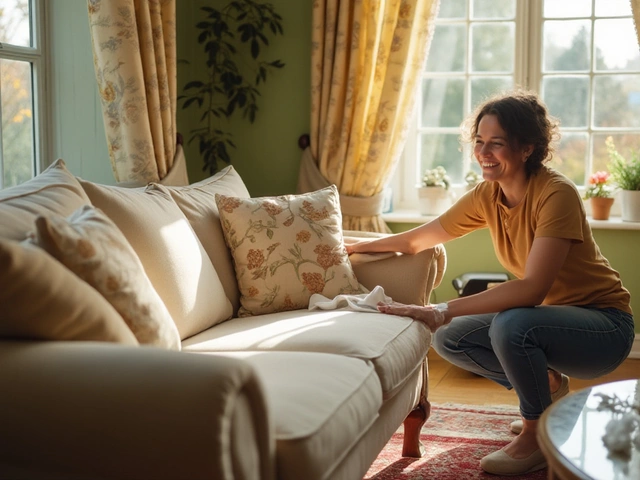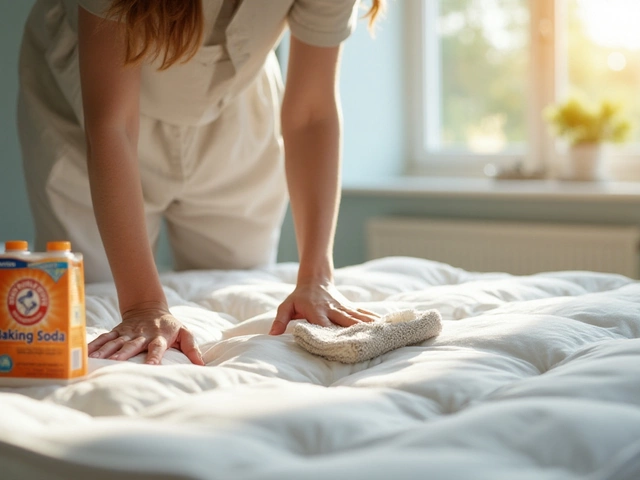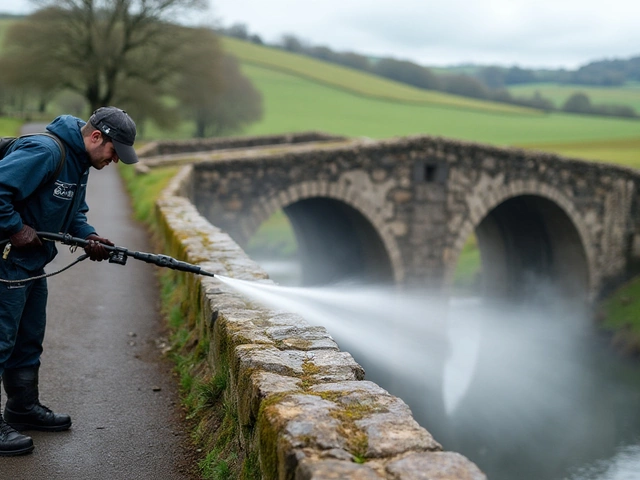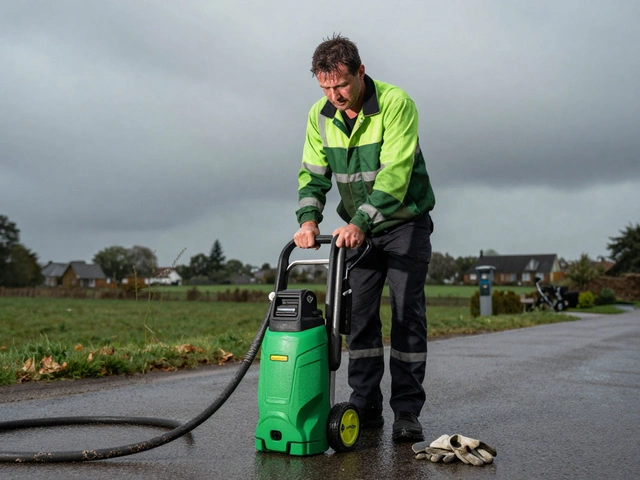Vinegar, it's the jack-of-all-trades in the cleaning world, right? This eco-friendly powerhouse is beloved by many for its ability to tackle grime and banish odors. But hey, it's not the magic potion for every cleaning conundrum out there. In fact, there are surfaces where vinegar can do more harm than good. Yes, you heard that right—vinegar has its limits.
Imagine this: you’ve just installed beautiful marble countertops, or maybe your kitchen's sporting a snazzy granite island. It might feel like a natural winner to grab that jug of vinegar for a quick clean. But hold on! The acid in vinegar can erode the finish, leaving your pricy investment looking dull or scratched. Yikes!
Now, think about those hardwood floors that you’ve painstakingly maintained. They shine and glow just right. One wrong swipe with vinegar and you might just strip away that sheen. Vinegar’s acidity can be a disaster for the protective coating, turning gleam into gloom.
And let's not forget metals. Sure, vinegar can make some metals sparkle, but it's a different story with the likes of aluminum and cast iron. Vinegar's acidity can lead to pitting and corrosion, making your beloved pans and pots less than functional.
Knowing what not to clean with vinegar keeps your home in tip-top shape, and lets you enjoy its eco-friendly benefits without the scare of unintended damage. So, let’s steer clear of vinegar on these surfaces and opt for solutions better suited for them!
- Vinegar: The Cleaning Superstar?
- Surfaces That Hate Vinegar
- Granite and Marble
- Hardwood Floors
- Metals That Are Not Vinegar-Friendly
- Alternatives for Vinegar-Unsafe Surfaces
Vinegar: The Cleaning Superstar?
Vinegar has long been praised as the unsung hero in the world of eco-friendly cleaning. It’s the staple you've probably seen in your grandma's pantry, and for good reason! This humble liquid, mainly composed of acetic acid and water, packs quite the punch when it comes to cleaning, thanks to its acidic nature. It tackles a wide variety of household grime, all while being kind to Mother Earth. But how does it work its magic, you ask?
Well, vinegar is naturally antibacterial, which means it's great for killing off those pesky germs on surfaces like kitchen countertops and bathroom sinks. Just mix equal parts water and vinegar in a spray bottle, and you've got yourself a homemade cleaner. Want to cut through grease and grime on your stovetop? Vinegar’s got your back.
Hard water stains laughing at your usual cleaning efforts? Not anymore! Vinegar can dissolve those tough mineral deposits without breaking a sweat. Just let some vinegar sit on the stain for a bit and watch how nature's cleaning agent gets to work. Feeling fancy? Combine it with baking soda for a foamy cleaning action that's almost like a mini science experiment.
If you’re into stats, consider this colorful usage chart for vinegar at home:
| Use | % of People Using Vinegar |
|---|---|
| Descaling Coffee Makers | 42% |
| Disinfecting Countertops | 55% |
| Removing Mineral Deposits | 65% |
| Cleaning Windows | 35% |
But remember, while vinegar is a cleaning superstar for a lot of tasks, it’s not a one-size-fits-all solution. You need to know when to harness its superpowers and when to tread carefully. Stick around, and we'll get into the nitty-gritty of surfaces that don’t mix well with vinegar.
Surfaces That Hate Vinegar
So, vinegar is this great go-to for cleaning, but it has its enemies. Some surfaces just don't get along with it, and using vinegar on them can end in disaster.
First up, we've got granite and marble. These materials are super popular for countertops because they look amazing and can really boost your kitchen's style game. But vinegar? It's a no-go. The acidity in vinegar can wear down these stone surfaces and leave them looking dull and scratched over time. Not cool, especially after you spent a pretty penny on them!
Next on the list, hardwood floors. They're the pride of many homes, but vinegar? Not their friend. The acid can munch through the finish, turning your floor from shiny to blah. If you've got those floors, it's way better to stick to cleaners that are made for wood.
Then we've got some metals, like aluminum and cast iron. Sure, vinegar shines up some metals, but for these guys, it's trouble. The acidity can lead to pitting and make them corrode faster—definitely not what you want on pots and pans or metal hardware.
- Electronics and computer screens: Vinegar can seep into the gaps, and the acid might mess with the coatings or even the electronics themselves. Yikes! Better stick with a microfiber cloth and some special screen cleaner for these.
- Waxed furniture: If you’ve got furniture with a lovely wax layer, vinegar is a huge no. It will strip that wax right off, leaving the wood exposed and not at all protected.
Avoiding vinegar on these surfaces keeps them looking their best for years. Always double-check what works best for what you've got at home. Better safe than sorry!
Granite and Marble
Okay, so your kitchen’s got that amazing granite countertop or maybe a luxurious marble backsplash. They look stunning, right? These surfaces are real eye-catchers, but they need special care to stay that way. Now, here’s where vinegar cleaning shouldn’t be your go-to.
Why? Because granite and marble are calcium-based stones. Vinegar is acidic and reacts nastily with calcium, leading to etching and dull spots. Imagine vinegar gnawing away at your sleek surface—what a nightmare! Still tempted to give them a quick wipe with vinegar? Think again, it can lead to major regrets.
So, what’s a better option? Stick to pH-neutral cleaners. You know, the ones that say they're safe for natural stone. If you’re into eco-friendly cleaning, you can use a bit of dish soap mixed with warm water. Just lightly dampen a soft cloth, wipe, and you're good. Be gentle, though; scrubbing too hard might scratch.
For those times you see a stain, try a baking soda paste. A little water mixed with the soda until it's paste-like can tackle most spills. Apply, give it a few minutes, then rinse. Easy, right?
In short, when it comes to granite and marble, maintain that royal treatment. Keep vinegar far away, and instead use methods that truly honor the classy surface.
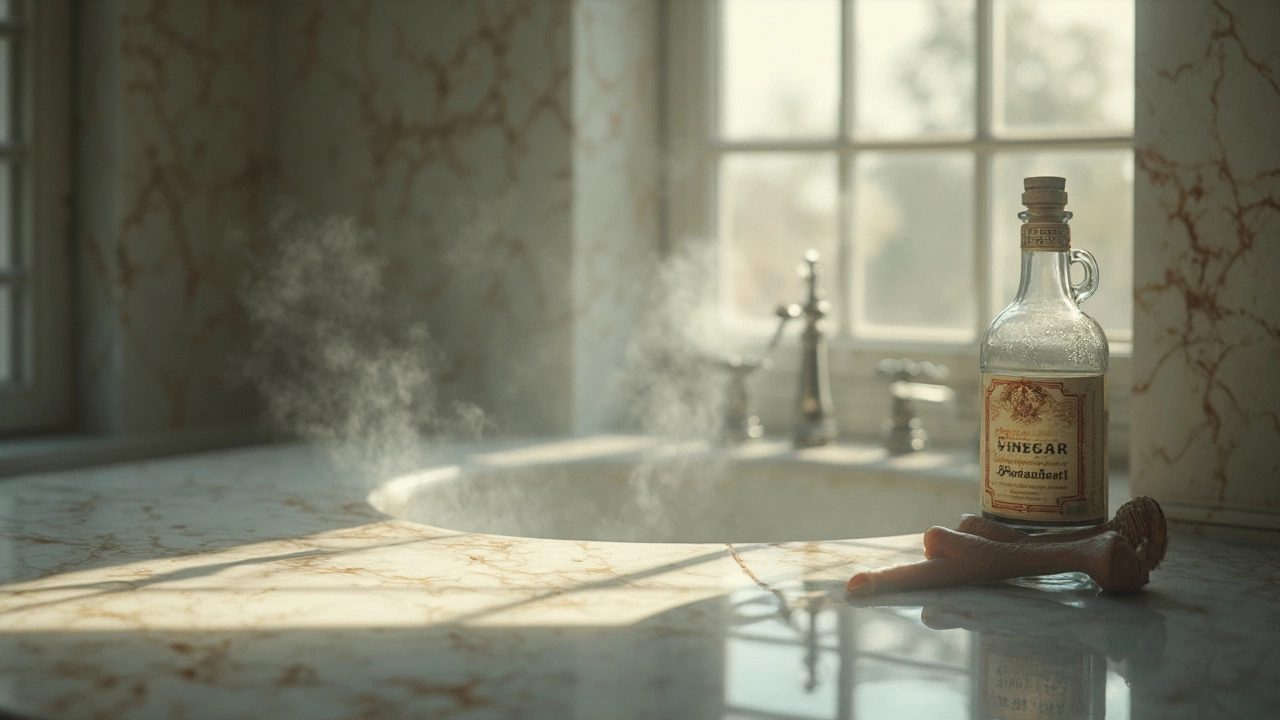
Hardwood Floors
Thinking about cleaning your hardwood floors with vinegar? Let’s pump the brakes on that one. While vinegar is a cleaning favorite for many surfaces, it's not so friendly with hardwood. The issue here is all about acidity. Vinegar, with its acetic acid, can actually strip away the protective finish on your floors.
This finish is what keeps your floors looking sleek and polished. Without it, you’re left with dull, lifeless wood that’s more susceptible to scratches and stains. Hardwood is a big investment, so it's important to treat it with care.
So what should you use instead? Here are a few tips:
- Grab a commercial wood floor cleaner that’s made specifically for hardwood. They are designed to clean without damaging the wood.
- If you’re into DIY, a mix of water and a few drops of dish soap can do the trick for everyday cleaning. Just make sure to dry the floor quickly so excess moisture doesn’t seep in.
- Always remember to sweep or vacuum regularly to avoid scratches from dust and grit. This is like the first line of defense in keeping your floors pristine.
One quick way to test if your cleaning method is safe? Look for dulling. If your floors lose their shine, it might be time to rethink how you’re cleaning them.
Some folks are surprised that vinegar isn’t the go-to cleaner for everything. But knowing the right way to preserve and clean your hardwood floors will keep them looking fantastic for years. Smart cleaning choices = happy floors!
Metals That Are Not Vinegar-Friendly
Alright, let's talk about metals that definitely don't want even a whiff of vinegar near them. While vinegar is great for shining up some metals like stainless steel, when it comes to others, it's like kryptonite. If you've got anything made from aluminum, copper, or cast iron, do yourself a favor and keep the vinegar far, far away.
Starting with aluminum, this lightweight and durable metal is popular for pots, pans, and even some appliances. But vinegar's acidic nature can lead to pitting and corrosion over time. Not cute. Pitting makes tiny holes on the surface, which isn’t just bad news for the look of your pots—it's also bad for their longevity.
Then there’s copper. While some folks like the rustic look of tarnish, if you prefer your copper shiny and new-looking, steer clear of vinegar. This acid can speed up tarnishing or cause discoloration that might not buff out easily.
Cast iron pans are another no-vinegar zone. These beauties can last generations if properly maintained. But vinegar can strip away the seasoning—basically, that nice non-stick surface you’ve worked so hard to build up. Without it, your cast iron is prone to rust, and no one wants that!
So, what’s the alternative for cleaning these metals? For aluminum and copper, stick to a mixture of mild soap and warm water. For cast iron, a bit of hot water and a stiff brush should do the trick—just be sure to dry it thoroughly to avoid rust. Always remember, taking care with what cleaners you use ensures your metal items stay in top shape for years.
Alternatives for Vinegar-Unsafe Surfaces
If you've realized that vinegar isn't the best buddy for some surfaces, fear not! There are plenty of other eco-friendly cleaning options that can step in and keep things shiny without any damage. Let's dive into a few alternatives that work wonders.
Granite and Marble: When it comes to these natural stones, pH-balanced cleaners are your safest bet. You can easily make your own by mixing a few drops of mild dish soap with warm water. Just apply with a soft cloth, and you're set. Avoid abrasive scrubbing pads; they can scratch the surface.
Hardwood Floors: For your precious wooden floors, stick to products specifically designed for hardwood. A simple homemade solution is a mixture of water and a bit of castile soap or hardwood floor cleaner. Always ensure to dry the floors promptly to prevent any warping.
Metals like Aluminum and Cast Iron: Both of these metals require special care. For aluminum, a mix of baking soda and water can clean without the risk of corrosion. For cast iron, avoid water completely—instead, use coarse salt and a gentle scrub to remove residue.
- Tip for Metal: Always ensure these surfaces are thoroughly dried after cleaning to prevent rust.
For those looking for convenient store-bought options, check labels for terms like 'stone-safe' or 'wood-safe' to avoid vinegar's acidic nature. There's a growing market for eco-friendly cleaners that are both effective and gentle on sensitive surfaces.
Switching up your cleaning game to suit each material ensures that everything stays in good shape and lasts longer. Plus, it aligns seamlessly with staying eco-friendly while protecting your investments!
